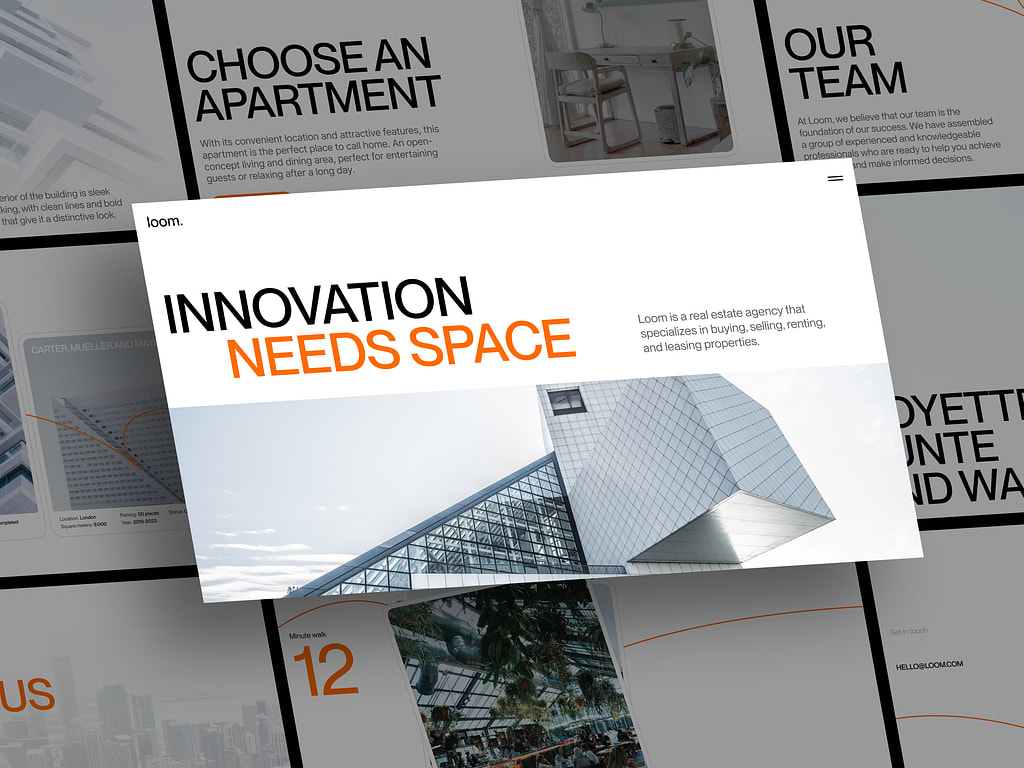
Perhaps you’ve encountered the frustration of sifting through countless property listings or the challenges of connecting buyers and sellers seamlessly. If you’re nodding in agreement, it’s time to take a closer look at the transformative power of mobile app development for real estate.
In an era where digital solutions reign supreme, the real estate landscape is no exception. Buyers and sellers demand efficiency, accessibility, and simplicity in their property transactions. The good news? Creating your very own mobile app can be the game-changing move you’ve been searching for.
In this article, we’re about to embark on an enlightening journey that will not only ease your real estate-related pains but also empower you to make a significant impact in the industry. We’ll unravel the secrets of development, insights, and tips.
Why develop a real estate app?
It’s a powerful tool that serves both clients and startups in the industry. These apps have redefined the way individuals search for, buy, sell, and manage properties.
- Ease of property search: technology for real estate provides clients with an effortless way to search for properties based on their specific criteria, such as location, price range, and property type. This convenience saves clients valuable time and effort compared to traditional property hunting methods.
- Accessibility: mobile apps provide clients with 24/7 access to property listings, empowering them to explore the market at their convenience, whether at home, at work, or on the go.
- Market expansion: it opens up a vast market for startups and businesses. As more clients turn to mobile apps for their property needs, there’s ample room for growth.
- Revenue streams: apps for real estate offer multiple revenue streams for startups, including premium subscriptions, in-app advertising, and referral programs. These income sources drive profitability.
- Data insights: apps collect valuable user data, which startups can analyze to understand user behavior, preferences, and market trends. This data-driven approach enables startups to refine their services and stay competitive.
- Brand visibility: a functional and user-friendly application significantly enhances brand visibility and reputation in the industry. Positive user experiences lead to word-of-mouth recommendations and customer loyalty.
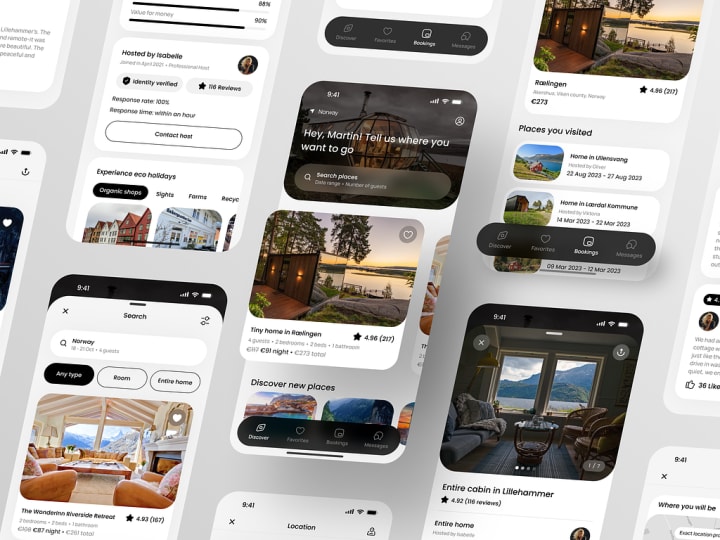
Understanding the landscape
Last year, the market has reached around $202 billion. More than 50% of digital businesses start directly investing in real estate technologies. Also, according to the research, 43% of all purchasers seek houses for sale online.
As for the real estate technology trends, they include:
- Automated rental platforms
- 3D virtual tours for houses
- AI chatbots for client support
- Big data and machine learning
- Internet of Things (IoT)
How to create a real estate business app?
The safest way is to start by conducting in-depth market research to pinpoint gaps and opportunities for your project. Check what features you can implement in your application, what problems you can solve, and what you should avoid, etc. Learn from your rivals’ mistakes.
The next thing is to brainstorm ideas for your project. Discover unique selling points that will set it apart. Think about your potential clients and their pains. How can you ease them? In general, your app should help people reach their main goal – that is, renting an apartment or a house – without much hassle.
Essential and non-essential features
As for the features, they can vary depending on its specific goals and target audience. However, here are some essential and non-essential options that you might consider:
Essential features
- Property listings: display a wide range of property listings, including houses, apartments, condos, and more. Add filter and search options to help users find properties based on location, price range, property type, and other criteria.
- Property details: provide detailed information about each property, including photos, descriptions, price, square footage, number of bedrooms and bathrooms, and contact details for the seller or agent.
- Maps and location services: think about integrating maps with pins to show the exact location. Additionally, you can implement geolocation services to help people find properties in their current vicinity.
- Contact options: it’s more convenient to contact sellers directly through the real estate agents’ apps. So include contact forms, phone numbers, and email links.
- Mortgage calculator: this will allow your clients to estimate their monthly payments based on property price, interest rates, and down payment.
- Reviews and ratings: they will build trust and credibility in the platform.
Non-essential features
- Property valuation tools: for example, automated valuation models (AVMs). They use a wide range of data sources to determine property values.
- Neighborhood information: spare people from asking the neighbors and offer data about local amenities, schools, crime rates, and public transportation options.
- Mortgage pre-approval: collaborate with mortgage lenders to offer pre-approval services to potential buyers.
- Alerts: people can’t monitor listings 24/7. Allow them to set up notifications for specific criteria and receive alerts when new properties matching their preferences become available.
- Augmented Reality (AR): if you go for a 3D virtual tour, consider implementing AR features to visualize how furniture or renovations would look on a property.
- Investment analytics: there are many people who are interested in investment, so provide property appreciation forecasts and rental yield calculations.
- Legal and contract tools: offer resources and templates for drafting contracts, understanding local laws, and other legal aspects.
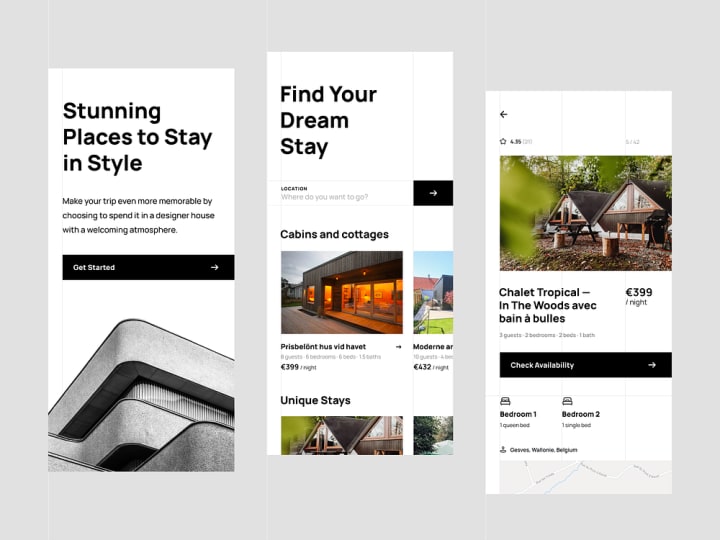
Monetization options
Monetization options for a real estate app can vary depending on your business model and target audience. Apart from in-app advertising, premium reports, and the freemium model, you can consider:
- Listing fees: Charge agents or property owners a fee to list their properties on your application. This can be a one-time fee or a subscription-based model.
- Subscription plans: Offer subscription plans to users who want access to premium features or exclusive property listings. Subscription tiers can include benefits like advanced search filters, priority notifications, or enhanced property details.
- Featured listings: Allow property owners or agents to pay for featured listings that appear prominently in search results or on the app’s homepage.
- Affiliate marketing: Partner with mortgage lenders or moving companies, and earn a commission for referring users to their services through your app.
Mobile app development for real estate
After defining the features, switch to selecting the right technology stack and finding experienced developers. Choosing the right technology stack for developing a real estate app is a crucial decision that can impact product performance, scalability, and development speed. Your choice of technologies should align with your specific requirements and objectives.
Decide whether you want to build a native (iOS and Android), a cross-platform (using frameworks like React Native or Flutter), or a web app. Your choice will influence the technology stack. If you’re developing native mobile apps, you’ll need to choose technologies for iOS and Android separately. For iOS, use Swift or Objective-C, and for Android, use Kotlin or Java.
Choose a backend technology that can handle data storage, user authentication, and API development. Common backend technologies for real estate apps include:
- Node.js
- Ruby on Rails
- Python (Django or Flask)
- PHP (Laravel)
- Java (Spring Boot)
Select a database system that suits your data storage needs. For example:
- Relational databases (e.g., PostgreSQL, MySQL)
- NoSQL databases (e.g., MongoDB, Cassandra)
- Geospatial databases (if you need to handle location-based data)
Choose a front-end technology or framework for building the user interface. You can opt for one of these:
- React
- Angular
- Vue.js
- Native app development for iOS and Android (Swift, Kotlin)
For integrating maps and location-based features, consider using services like Google Maps API or Mapbox. They offer SDKs and APIs for adding mapping functionality. Also, identify any third-party services or APIs you need to integrate, such as payment gateways, AVMs, or social media sharing.
Additionally, choose a cloud hosting provider (e.g., AWS, Azure, Google Cloud) and set up a DevOps pipeline for continuous integration and deployment (CI/CD).
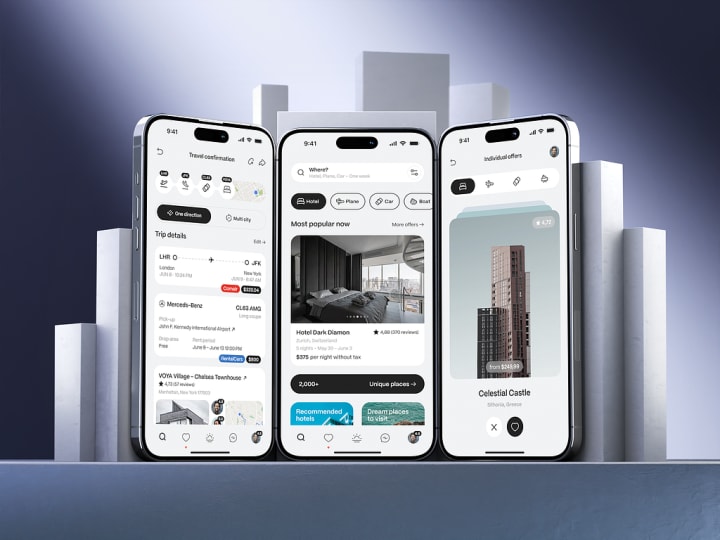
Development costs
Obviously, they will vary depending on the project. For instance, opting for a 3D virtual tour with AR will make the expenses skyrocket.
There are a few ways you can cut the costs. Hiring an outsourcing development team will reduce your expenses by around 50%. The development agency usually costs less and charges around $40-45 per hour for app development and $75-80 per hour for the design. While an in-house team will charge around $150 per hour.
Simple app with 5-10 pages:
- Approximately 370+ hours ($16 650) for development
- Around 202+ hours ($16 160) for design
- Around 988+ hours ($44 460) for a custom approach
Total: ~ $32 810 or $60 620 for custom development
Complex app with 10-15 pages:
- Approximately 553+ hours ($24 885) for development
- Around 318 hours ($25 440) for design
- Around 1 426+ hours ($64 170) for a custom approach
Total: ~ $50 325 or $89 610 for custom development
If you want to get a rough estimate for your project, try Project Calculator. With its help, you can discover potential expenses for development, branding, and UI/UX design.
Team
Developing a real estate app involves a variety of tasks and requires a team of specialists with different skills and expertise to ensure its success. Here are the key specialists you may need:
- Project manager: they oversee the entire development process, coordinate tasks, manage timelines, and ensure that the project stays on track.
- UI/UX designer: for creating the app’s visual design and layout. They also focus on improving the overall user experience.
- Front-end developers: these specialists implement the UI/UX design and create the client side of the app using technologies like HTML, CSS, and JavaScript.
- Back-end developers: these ones build the server-side logic of the app, manage the database, and handle user authentication and data storage.
- Database developer: they design the database architecture, ensuring efficient storage and retrieval.
- Quality Assurance (QA) tester: the testers search for and report bugs. With their help, your app functions correctly and meets quality standards.
- Legal counsel: you should be aware of regulations and data protection laws. Legal experts can help you with them, as well as with privacy policies and terms of service.
- Real estate domain expert: having someone with industry knowledge on your team is invaluable for understanding user needs and market trends.
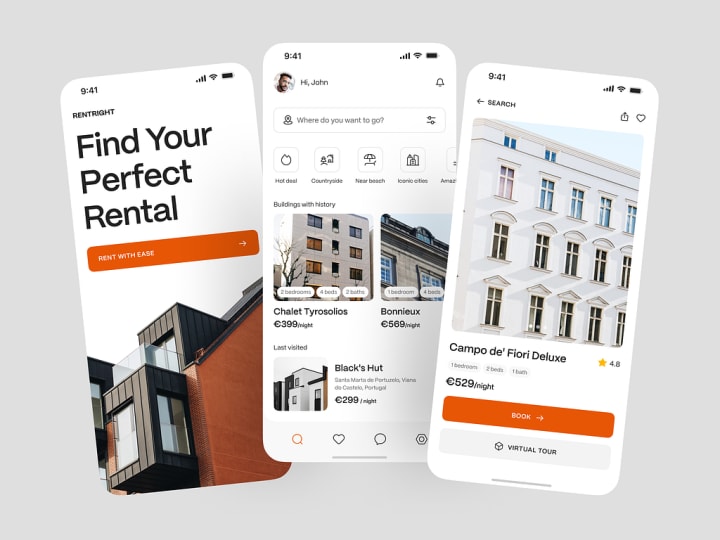
Conclusion
Creating a real estate app is an exciting venture with immense potential in the ever-evolving world of technology and property markets. Whether you’re aiming to streamline property transactions, connect buyers with sellers, or offer unique market insights, the possibilities are vast.
However, it’s important to remember that the industry is highly competitive and continually changing. Staying attuned to market trends, user feedback, and emerging technologies will be key to your app’s long-term success. With the right vision, technology, and dedication, your app can find its place in this dynamic industry, transforming how people buy, sell, and interact with the world of real estate.
About the Creator
Shakuro
We are a web and mobile design and development agency. Making websites and apps, creating brand identities, and launching startups.


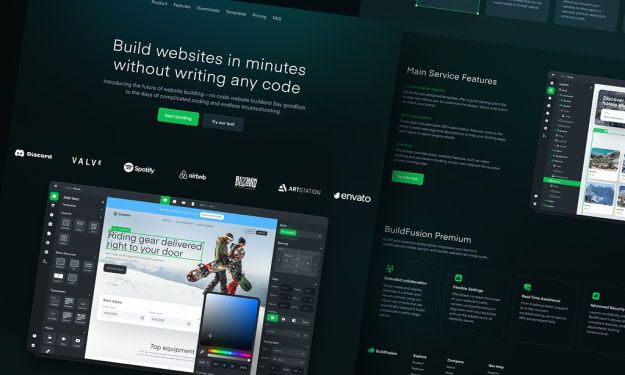



Comments
There are no comments for this story
Be the first to respond and start the conversation.